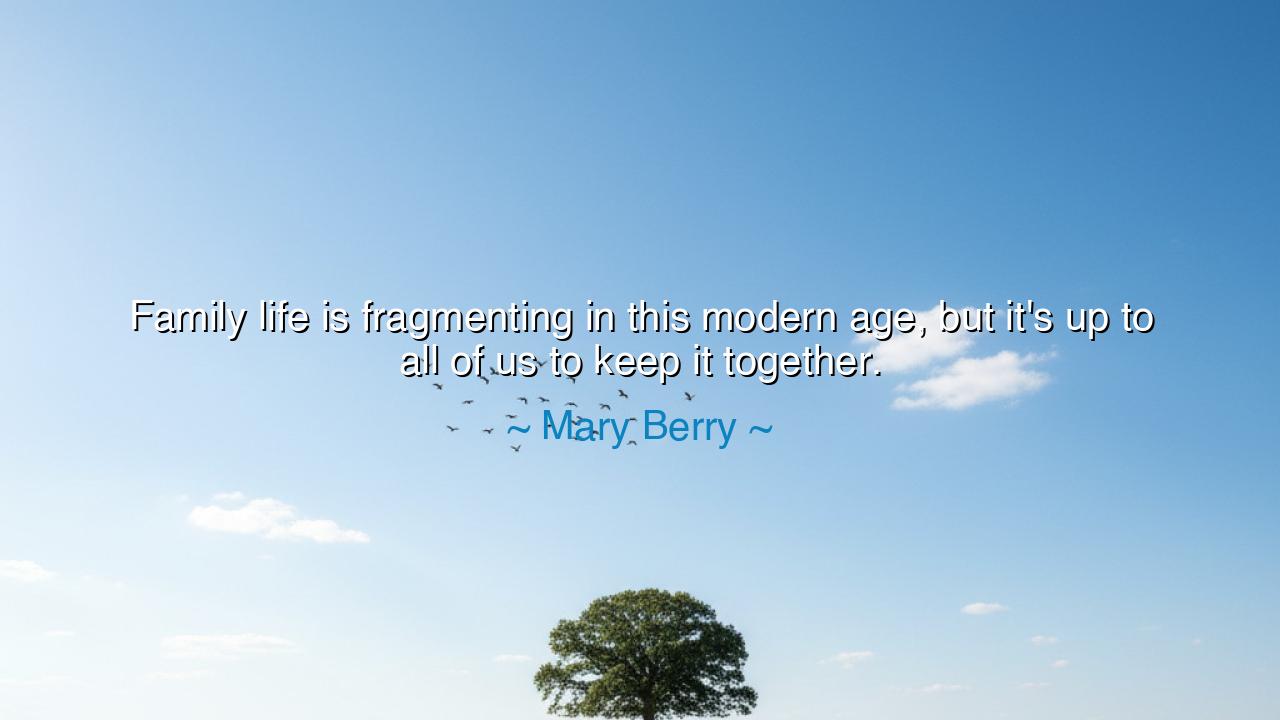
Family life is fragmenting in this modern age, but it's up to all
Family life is fragmenting in this modern age, but it's up to all of us to keep it together.






"Family life is fragmenting in this modern age, but it's up to all of us to keep it together." These powerful words, spoken by Mary Berry, strike at the heart of a profound and growing truth. In an age marked by rapid change, technological advancement, and shifting cultural values, the family unit—the bedrock of society—finds itself under strain. As the world becomes more interconnected and fast-paced, it is easy to see how the bonds that once held families together may begin to fragment. Yet, Berry’s words are a clarion call to action, urging each of us to take responsibility for the preservation and strengthening of the family, understanding that the stability of society itself depends on it.
To understand the gravity of Berry's reflection, we must look back to the ancient world, where the family was the foundation of society. In ancient Greece, for example, the family was central to the social and political structure. Homer’s epics, such as The Odyssey, tell of heroic journeys, but they also emphasize the importance of family—the loyalty of Penelope to Odysseus, the sacrifices made by Telemachus for his father’s return. These stories convey the idea that the family is not merely a unit of personal connection, but a symbol of stability, a vital anchor in a world full of chaos. Just as Homer spoke of the unbreakable ties between family members, so too must we recognize that in modern times, the family holds the power to bring about unity, even amidst the fragmentation of modern life.
Mary Berry’s insight acknowledges a painful truth: the world we live in today is not as conducive to nurturing these ties as the world of the past. The pressures of modern life—the demands of work, the speed of communication, the constant distractions of technology—have eroded the time and space necessary for families to truly connect with one another. Yet, even in the face of this fragmentation, Berry's call to action is clear: it is not too late to reclaim and rebuild the foundations of family life. The power to preserve these sacred bonds lies within each of us.
Consider the example of Mahatma Gandhi, who, despite leading a nation toward independence and engaging in battles for the freedom of millions, always held his family close. Gandhi's life was marked by the balance between public duty and family commitment. In his personal life, he was deeply devoted to his wife and children, understanding that the strength of his nation began with the strength of his home. His dedication to his family was not just a matter of personal love but a recognition that a nation built on love, care, and mutual respect begins with the unity of the family. Gandhi’s example shows us that even in the most tumultuous times, family provides the grounding necessary to make a difference in the world.
This truth echoes through history: a stable society is built on stable families, and the bond of family, once forged, can weather the storms of life. Consider the Roman Empire, which rose to dominance on the backs of its citizens, each one shaped by the teachings and values of the family unit. The family was seen as the first school for virtue, the place where children learned the duties of loyalty, respect, and hard work. While the empire eventually crumbled, the values embedded in the family structure helped to form the foundation of Western civilization. The family, therefore, is not just a unit of personal relationships, but the first institution that shapes our society.
Mary Berry’s statement is not simply a call for nostalgia or a lament for the past, but a directive for our present and future. The fragmentation of the family does not have to be our destiny. Just as Homer’s heroes fought to protect their families, just as Gandhi found strength in his familial bonds, so too must we fight to preserve and nurture the family unit. Each of us must become an active participant in strengthening these bonds. It is not enough to simply lament the changes; we must actively seek ways to build stronger, more connected families. We must prioritize time together, nurture communication, and create spaces where each member of the family can feel valued and loved.
The lesson here is clear: family life, in all its forms, must be cherished and protected. It is not just a personal matter, but a societal one. The very fabric of our communities depends on the strength of the relationships we cultivate at home. Berry calls upon each of us to take responsibility, not only for our own families but for the broader community in which those families exist. We must care for one another, invest in our relationships, and understand that the future depends on the strength of the familial ties we nurture today.
In practical terms, we must take time to be present with our families—whether through shared meals, conversations, or simple moments of connection. Let us listen, support, and respect one another, building a foundation of love and understanding that will sustain us through the difficulties of modern life. Like the ancients, who saw the family as the cornerstone of society, we too must recognize that by building strong families, we are laying the groundwork for a stronger, more compassionate world. It is up to us, each and every one, to ensure that the golden age of family does not slip away but thrives in our homes, our hearts, and our communities.






AAdministratorAdministrator
Welcome, honored guests. Please leave a comment, we will respond soon